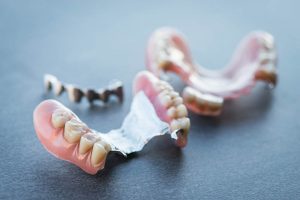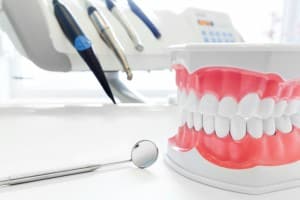
Missing teeth often leave gaps that can cause both eating and speech problems. Additionally, teeth left on either side of the gap may grow into the space at some angle. That’s why no one wants to lose their natural teeth.
But no matter how you take care of your teeth, age and decay can force you to have it extracted. When this happens, your options include:
- Removable teeth replacement (partial or complete dentures)
- Fixed replacement (bridges or implants).
Depending on the level of damage, you may need to remove the remaining teeth. For teeth replacement, the most popular option is having dentures.
What are dentures?
These are removable false teeth made of nylon, acrylic (plastic) or metal that fit snugly on the gums in the socket where teeth are missing. Dentures are custom-made for you.
The patient chooses whether the denture would be made of acrylic or metal. The denture bases will however be made from a rigid acrylic. To ensure that your denture fits perfectly, the dental prosthetist will normally take moulded impressions of your mouth that will be used to create the denture.
The kind of dentures the dental prosthetist fits for you will depend whether you just had a few or all of your teeth removed. What you need also determines how much you need to pay. Prepare to pay anywhere at least $1,900 for upper and lower full dentures.
And if you choose to have your dentures made out of porcelain, this costs slightly higher. Upper partial dentures cost $600 upwards on average while each tooth may cost $43.
No matter the cost, both partial and complete dentures replace missing teeth and eliminate the potential problems generally caused by gaps.
Partial dentures

The bases of most partial dentures are made from a rather flexible type of thermoplastic such as nylon. Though these are little expensive, but they feel and look more natural.
Complete Dentures
Also referred to as full dentures, these are made and used when all the teeth are missing. To fully replace teeth in the upper jaw, the dentures will include a flesh-coloured acrylic base covering the gums as well as the roof of the mouth. This allows the entire set of false teeth to sit firmly in place.
Though complete dentures for the lower jaw are similar, their acrylic base is typically shaped like a horseshoe so they can avoid covering the tongue.
 What to expect when getting your first denture?
What to expect when getting your first denture?
If you have some or all of your teeth missing, you should consider having them replaced with partial or complete dentures to restore your confident smile and ability to chew.
After you choose to have a denture, here’s what to expect between your visits to the DP and the time you’ll take to adjust to new dentures.
Fitting your denture
- The DP will first take you through the steps in fitting – explaining in details what you are supposed to expect.
- They will also explain if you’ll need to have any remaining natural teeth removed before fitting the dentures.
- Then he/she will remove any remaining teeth in the jaw before fitting the dentures.
Dental impression
The DP will take moulds of your mouth in order to create a denture that suits you.
Bite moulds
The dental prosthetist uses wax blocks to check if you’re comfortable when you bite with your denture on. During this phase the DP may also ask you to choose the shape and colour of your new teeth.
Wax models
The dentures (your new teeth) are set in wax. This helps you get a good idea of how your final denture will look.
Fitting
The final phase is to fit your denture. You are then given instructions on how to care for the denture.
Adapting to dentures
Once you have your new dentures fitted, you may use them. However, it’s important to understand that dentures are not exactly like regular teeth. They need a different type of care and require some getting used to.
It may feel weird to have new dentures in your mouth at first, but your tongue, mouth and the facial muscles eventually get used to it. You just need to be patient and practice speaking and eating with it.
To make the process more comfortable, your dental prosthetist may recommend using denture adhesives and cleansers. These should help you feel a lot more confident while wearing your new denture.
Note that the prices for the dentures will depend on many factors such as:
- The work that’s involved in fitting the dental prosthetist.
- The number of follow-up appointments needed overed.
- The type of dentures that you choose. Different dental prosthetists also charge differently for their respective services, so it’s rewarding to canvas around for the best deals.
Conclusion
Dentures can be the best thing since sliced bread for anyone who has missing teeth. If some or all of your teeth are missing, find a dental prosthetist to recommend the right dentures for you. Whatever your budget, there are a suitable plan and denture type to help you enjoy your life again.

 What to expect when getting your first denture?
What to expect when getting your first denture?









